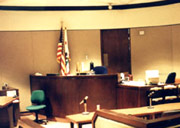| The University of California has asked the U.S. Supreme Court to hear an appeal to overturn a decision that banks could not be held responsible for losses incurred during the Enron Corporation scandal. The university is the lead plaintiff in the class-action lawsuit involving 50,000 plaintiffs, originally filed in 2001 against a number of banks; only three banks remain defendents at this point, said UC spokesperson Trey Davis. The three banks involved are Merrill Lynch, Barclays and Credit Suisse First Boston. In April, the university filed a petition along with the other plaintiffs asking that the U.S. Supreme Court hear the appeal. On Monday, the university filed a brief asking that the court hear the appeal at the same time as another case that also grappled with the degree of responsibility for secondary actors like the banks. Enron Corporation was found to have committed investor fraud in 2001 and then collapsed. The university alleges that banks knew of the fraud and should now be held responsible for their role in Enron’s investor fraud. The total alleged loss for all plaintiffs involved is estimated at $40 billion, Davis said. According to Davis, the university lost approximately $145 million in investments as a result of the fraud and collapse. The 50,000 plaintiffs include both individual and institutional investors, although Davis said the university was one of the pension funds with substantial losses. The case had been heard in March by the U.S. Court of Appeals for the Fifth Circuit; that court ruled in favor of the banks in a 2-1 vote. The idea of holding banks responsible for their part in the Enron scandal would bring into question the concept of scheme liability. Scheme liability envisions fraudulent practices involving additional parties who actively and knowingly participate in the fraud, Davis said. “We’re alleging that banks knew what they were doing and did what they did to perpetuate the fraud,” Davis said. “Scheme liability means banks were part of the scheme as opposed to just being innocent bystanders.” While three banks currently remain as defendents, Davis said a number of other banks that had been involved in the case have settled for a total of approximately $7 billion out of court. If the Supreme Court decides in the university’s favor, Davis said the remaining three banks could have the option to settle out of court as well. Davis said he did not know when the Supreme Court is expected to respond or what the next steps will be for the case, adding that the university hopes the plaintiffs will get the chance to go to trial. |





